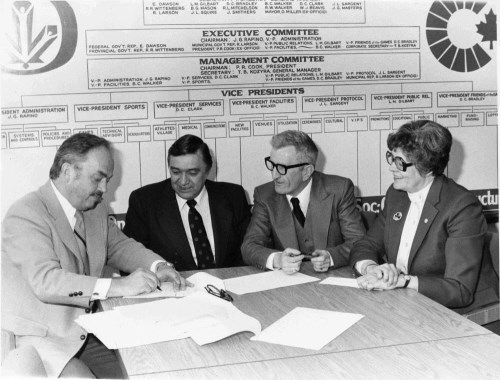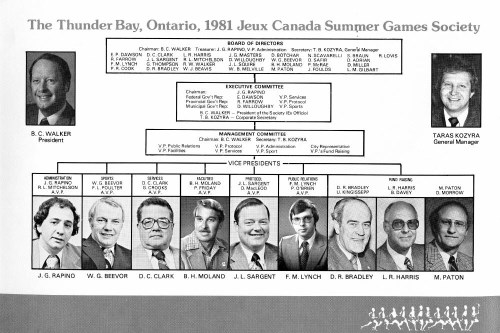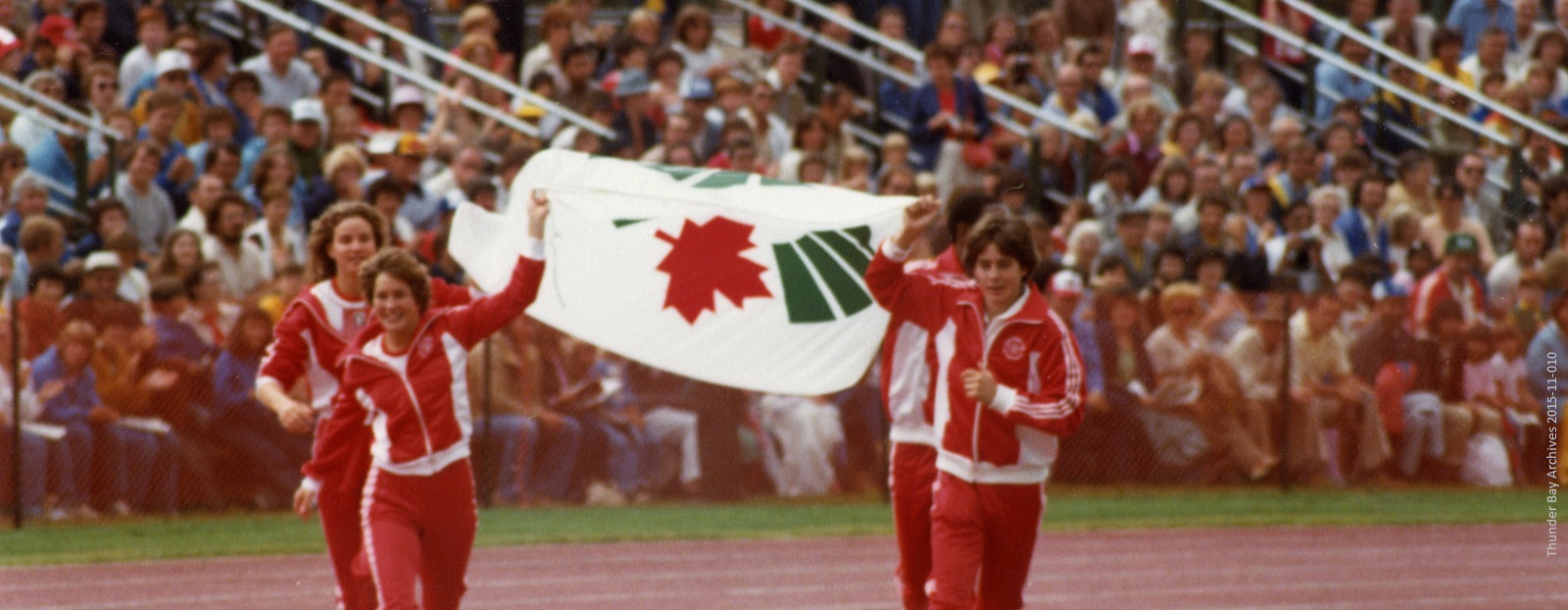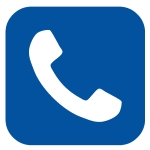The Early Days
The Jeux Canada Games would never have happened without the effort, dedication and support of over 5,000 volunteers, 67 staff and the leadership of the executive branch. The host society’s responsibilities were extensive and a great deal of work was required to ensure the Games could go off without a hitch. Some of the key tasks that lay ahead for the host society included: planning the opening and closing ceremonies, arranging accommodations for the officials and athletes, raising funds, organizing sports events, orchestrating publicity to promote the event and the construction and upgrading of sport facilities to stage the Games. Preparations for the Games began in 1977, some five years before the event took place. Before Thunder Bay had been designated as the official host city for the Games, work was already underway to gain City Council’s approval to compete for the Games and prepare the bid proposal that would eventually win the event for Thunder Bay.
Four Party Agreement
City Council approved the proposal to bid for the Games on July 26, 1977. Cities all over the country competed for the bid, including the cities of Kingston and Sudbury in Ontario. Once the bid had been submitted, the people of Thunder Bay waited three months to hear the news. When Thunder Bay successfully made the provincial short list, the City received a visit from the Host City Site Selection Review Team in November 1977. Included were three members of the Sports Federation of Canada, the Secretary of the Canada Games Council, a representative of the Provincial Director’s Council for Sports and Recreation and a staff member from the Sports and Fitness Division of the Ontario Ministry of Culture and Recreation.
After making a profound impression on the Selection Review Team, the announcement that Thunder Bay was to be the official host city for the Games of 1981 was made by Iona Campagnola, Minister for Fitness and Amateur Sport, and Robert Andras, Federal Treasurer, on Dec. 14, 1977.

Establishing the Host Society
As the first city in Ontario to win the bid for the Games, efforts were immediately put in place by the City of Thunder Bay to coordinate a host society to organize and manage the Games. City Council approved the establishment of the host society for the Jeux Canada Games on Feb. 21, 1978. From that time on, four years of tireless effort and dedication from host society staff and volunteers led to a landmark event for the City, which continues to shape Thunder Bay to this very day. The host society was governed by an Executive Committee and a Management Committee who reported to the Board of Directors. The management team of the host society was responsible for approving major purchases and expenses, making the final decisions on policies and resolving problems. The General Manager, Taras Kozyra, steered the overall direction of the host society and made reports and recommendations to the Board of Directors. Working to a strict deadline, the organization and administration of the host society were critical to its success in reaching the necessary goals by the time the Games were set to begin. The host society was broken up into six different divisions, each overseen by a Vice President, which reflected the key responsibilities of the organization. These divisions included Administration, Services, Protocol, Sports, Facilities and Public Relations.
Signing of the Four Party Agreement
 The host society, volunteers and contributors saw the culmination of their efforts in August 1981 when the Jeux Canada Games took place in Thunder Bay. However, when the Games came to an end, it did not spell the end of the host society’s responsibilities. At the completion of the Games, work was underway to distribute the assets that had been acquired throughout the course of the society’s operations, including distributing sporting equipment to various associations within the community. The management also implemented a plan to dismantle the organizational structure of the host society. Additionally, Post-Games reports were prepared describing the organization of the host society, the work undertaken, the hurdles faced and how they were overcome, while evaluating the success of the efforts from staff. These reports were created for the benefit of future host societies. Finally, the host society entered into an agreement with the City of Thunder Bay, transferring its rights and responsibilities upon dissolution. The host society officially dissolved on Dec. 31, 1981.
The host society, volunteers and contributors saw the culmination of their efforts in August 1981 when the Jeux Canada Games took place in Thunder Bay. However, when the Games came to an end, it did not spell the end of the host society’s responsibilities. At the completion of the Games, work was underway to distribute the assets that had been acquired throughout the course of the society’s operations, including distributing sporting equipment to various associations within the community. The management also implemented a plan to dismantle the organizational structure of the host society. Additionally, Post-Games reports were prepared describing the organization of the host society, the work undertaken, the hurdles faced and how they were overcome, while evaluating the success of the efforts from staff. These reports were created for the benefit of future host societies. Finally, the host society entered into an agreement with the City of Thunder Bay, transferring its rights and responsibilities upon dissolution. The host society officially dissolved on Dec. 31, 1981.
Financing for the Games
Finding a primary source of funding for the Games was a paramount concern for the host society from the first day. Months of negotiations led to the establishment of a Four Party Agreement between the Federal, Provincial and local governments and the host society. The agreement, which was signed on March 16, 1979, outlined major contributions for capital costs and operating expenses. The Governments of Canada, Ontario and Thunder Bay each contributed $1.5 million toward capital costs. This figure was based on the original estimated capital costs from an Administrative Report produced in 1977 that determined the host society would require a total of $4.5 million for capital costs. The Government of Canada agreed to contribute a maximum of $2,045,151 toward operating expenses, which was designated to be used for administration, sports, public relations, protocol and facilities.
Organizational Charts
 Other funding from the Canadian government contributed toward catering, salaries and benefits. In return, the host society agreed to organize, manage and promote the Games in accordance with the standards laid out in the Canada Games Handbook. They also agreed to raise funds from private sources and attempt to raise $151,000 from ticket sales. As work on organizing the Games got further underway, capital costs and operating expenses continued to grow well beyond the estimated budget established by the host society, doubling from $7 to $14 million over the four years leading up to the Games.² However, careful planning and innovative fundraising techniques meant that success could still be ensured and no deficits were accrued.
Other funding from the Canadian government contributed toward catering, salaries and benefits. In return, the host society agreed to organize, manage and promote the Games in accordance with the standards laid out in the Canada Games Handbook. They also agreed to raise funds from private sources and attempt to raise $151,000 from ticket sales. As work on organizing the Games got further underway, capital costs and operating expenses continued to grow well beyond the estimated budget established by the host society, doubling from $7 to $14 million over the four years leading up to the Games.² However, careful planning and innovative fundraising techniques meant that success could still be ensured and no deficits were accrued.
Aside from the government - businesses, associations and individuals also contributed toward funding for the Games. The Friends of the Games division was responsible for garnering support from the private sector. Headed by Vice President Duncan Bradley, the Friends of the Games division reached out to a variety of large firms across the country, local small businesses and service clubs. Many of the local service clubs participated in a city-wide business appeal, canvassing local businesses for support, while the two Rotary Clubs representing Fort William and Port Arthur contributed $30,000 that was allocated to capital costs for the Canada Games Complex. The Friends of the Games division also struck an agreement with the Ministry of Culture and Recreation’s Wintario program. In this agreement, the Ministry agreed to match each dollar raised through Friends of the Games initiatives on a scale of two to one. One of the largest private contributors of the Games was Molson Breweries. Molson contributed an upfront cash donation of $135,000 and received special recognition in return, including participation in the National Media Tour and exclusive presence at all major Games receptions.
² Post-Games Report completed by Taras Kozyra, General Manager. City of Thunder Bay Archives (TBA 8038-04).
Contact Us








